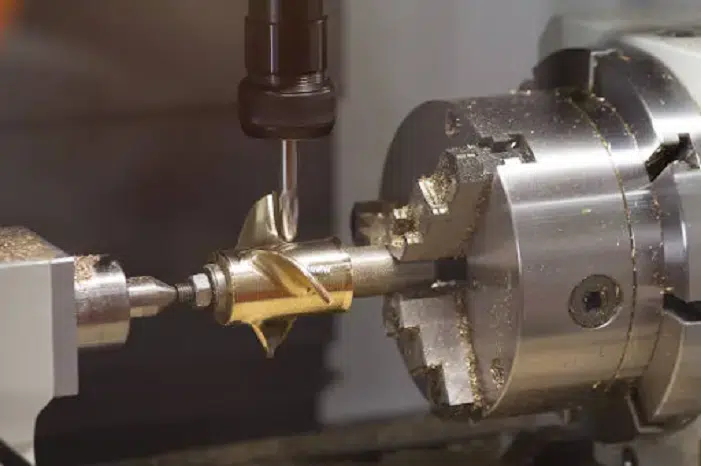With strength, thermal conductivity, and exceptional machinability, an alloy made mostly of copper and zinc, known as brass, has gained much recognition recently within the field of precision engineering.
This is attributed to its compatibility with CNC (Computer Numerical Control) machining. Such an evolution has created the opportunity to manufacture complex, durable, and aesthetically appealing parts meant for industrial applications.
For B2B companies that operate in the aerospace sector, electronics, medical devices, or even telecommunications, brass CNC machining presents a compelling proposition when it comes to achieving finer details, repeatability, and tight tolerances in production.
As the need for tailor-made components that can take pressure increases, suppliers of precision parts are emerging to provide on-demand, scalable, and high-quality solutions.
In this blog, I will detail the value of brass CNC machining in high-end industrial scenario, the involvement of machining techniques, and how seasoned suppliers support B2B clients in optimizing performance and efficiency.
Why Brass is Ideal for CNC Machining
Few industrial metals boast brass’s extreme speed of machining and low tool wear. This makes brass stand out from the rest. In addition to increasing productivity, these qualities ensure that parts possess clean finishes, along with well-defined and stable dynamic characteristics.
- Machinability: Brass maintains its position as one of the finest materials for cutting operations owing to its efficient cycle time, reduced maintenance, and tool wear.
- Corrosion Resistance: It can withstand harsh environments like marine and chemical processing.
- Thermal Conductivity: It is best suited for applications which require efficient heat dissipation.
- Electrical Properties: Brass is widely used in its alloy form in manufacturers’ parts like connectors and switches.
- Aesthetic Quality: Its gold-like color makes it highly attractive for most installations or instrumentation.
In the Case of precision parts suppliers, brass ranks high and offers a unique combination of functional strength and assistive machinability, enabling the efficient fabrication of intricate mechanical parts alongside ornamental features.
Applications of Brass CNC in Industrial Environments
Brass CNC machining is not limited to one industry—it is essential in several B2B manufacturing industries owing to its material properties and reliability.
- Aerospace: It is found in fluid regulation valves, low-friction bushings, and fasteners.
- Biocompatible Material: Brass is utilized in various surgical instruments and diagnostic tools.
- Electronics: It offers robust housing for sensors, signal connectors, and thermal transfer components.
- Telecommunications: Used in RF connectors and contact terminals owing to its superior electrical conductivity.
- Automation Systems: Brass parts are used in actuators and robotic arms owing to their precision-fit and durability.
These industries depend on precision parts suppliers not only for manufacturing services, but also for engineering consultancy, materials selection advice, and fabrication guidance, ensuring every brass part functions as intended.
Benefits of CNC Technology in Brass Machining
The use of CNC machines in the fabrication of brass components brings a number of production benefits:
Measurement Accuracy
Processes involving brass CNC can achieve tolerances of up to ±0.001mm. Such levels of precision are needed in developing tools for semiconductors or classifying — in the case of microfluidic devices — equipment into non-invasive or invasive categories.
Repetition Rectitude
Uniformity is essential for industries that churn out thousands of identical parts. With CNC machining, manufacturers can run large batches with minimal deviation from the original CAD design.
Improved Surface Treatment
Post-processing is often minimal on brass components due to the natural strength properties of the metal in terms of finish, which is enhanced by CNC turning and milling during machining. This saves time and costs.
Change Order Flexibility
From intricate engraving to threading and multi-axis contouring, CNC machining can respond to most changes without demanding major retooling.
It would not be incorrect to state as such: in the case of exploring opportunities in brass CNC, precision parts suppliers with sound expertise in CNC techniques stand out as key enablers for functional and aesthetic quality.
Common CNC Processes for Manufacturing Brass Components
Numerous machining processes can be applied to manufacture custom brass parts based on its geometry and production volume.
CNC Turning
This is most often applied to bushings, sleeves, and ferrules. Rotating features of parts are critical and this process has very good roundness and concentricity control which is very helpful with rotating components.
CNC Milling
Brass can withstand being milled at high speeds and precision bits do not damage its surface. This makes brass ideals when it comes to CNC milling. Brass components with complex geometries can have threads, pockets, and slots along with flat or irregular surfaces cut into them.
CNC Drilling and Tapping
Plenty of threads and internal holes in the brass components can be produced via these two operations. Due to the malleable property of brass, soft drilling can be performed quickly and cleanly, even for turning and milling setups.
Multi-Axis Machining
4- and 5-axis CNC machines are necessary to manufacture complex parts with multiple axes in only a few setups. This saves significant time and improves the overall quality while allowing for improvement in precision.
These are a few of the most popular methods used by suppliers of precision parts to ensure optimal performance for their B2B clients.
Selecting A Brass CNC Machine Partner
The rise in service providers has created a niche for specialized machining companies. Most B2B buyers indicate that suppliers who understand their technical specifications tend to evaluate and formulate solutions for their exact needs with much greater precision.
Focus On
- Brass Particulars: Knowledge around cutting and finishing operations greatly reduces errors.
- Precision Control Systems: Transparency in quality documentation, ISO certification, and other verifiable standards is a must.
- Ability To Customize: Flexibility for small-scope pre-production and wide-scope post-production is crucial for prototyping batches.
- Engineering Services: DFM (Design for Manufacturability) consulting, CAD/CAM consultation, and support for rapid prototyping among others.
- Time To Market and Volume Capacity: Partners with the ability to transition from low-volume to mass-volume production seamlessly are most ideal.
Peace of mind, reliability, and responsive support are non-quantifiable metrics that remove anxiety from precision parts suppliers, who specialize in advanced machining services beyond basic turning and milling operations.
Advanced Manufacturing and Its Impact on Brass CNC
Brass CNC machining will most likely remain the go-to for high-performance engineering, even as digital manufacturing grows.
The possibilities are boundless with the addition of technologies like AI-assisted machining, smart inspection tools, and innovations such as digital twins.
There is a growing need for high-precision small-scale, high-quality brass components in new industries like renewable energy electric mobility and medical implants.
This gives strategic foresight to invest in advanced next-gen precision parts technologies that are capable of fulfilling and predicting future requirements.
To sum up, the adaptability brought forth by custom orders with precision, uniformity, and reliability in intricate brass components makes brass CNC machining stand out like a sore thumb. B2B operations emphasizing extreme precision along with appealing exteriors require competent partners and precision parts suppliers to convert ideas into reality.



